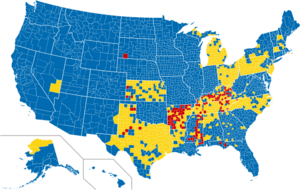Dry county facts for kids
A dry county is a special kind of area in the United States. In these places, the local government has decided that people cannot buy or sell alcoholic beverages. This means you won't find places selling drinks like beer or wine. Some dry counties don't allow stores to sell alcohol for you to take home. Others don't allow restaurants or bars to sell alcohol for you to drink there. Many dry counties are found in the southern part of the country.
Contents
What is a Dry County?
A dry county is a county where selling alcohol is against the law. This rule is set by the local government. It means that businesses like stores, restaurants, or bars cannot sell any type of alcoholic drink. This can include beer, wine, or stronger spirits.
Sometimes, a dry county might allow some types of alcohol to be sold. For example, they might allow beer but not wine. Or they might allow alcohol to be sold in restaurants but not in stores. The rules can be different from one dry county to another.
Why Do Dry Counties Exist?
Dry counties often exist because of historical reasons. Many of these laws started a long time ago, during a period called Prohibition. During Prohibition (from 1920 to 1933), selling alcohol was illegal across the entire United States.
Even after Prohibition ended, some local areas decided to keep their own rules. These decisions were often based on the beliefs of the people living there. Many communities felt that not selling alcohol was good for their area. They believed it helped keep their towns safer and healthier.
Local Choices and Beliefs
The decision to be a dry county is made by the people living in that area. They vote on these laws. This means that local beliefs and traditions play a big part. Some communities have strong religious or cultural reasons for not wanting alcohol sold.
These laws show how local governments can make different rules. What is allowed in one county might not be allowed in the next. This is why you see a mix of dry, wet, and moist areas across the country.
Different Kinds of Dry Areas
Besides dry counties, there are also smaller areas with similar rules. These can be called dry cities, dry towns, or dry townships. These are smaller parts of a county that have their own rules about alcohol sales.
For example, a county might be "wet" (meaning alcohol sales are generally allowed). But inside that wet county, there could be a "dry city" where alcohol cannot be sold. This shows how local rules can be very specific.
What Does "Wet" Mean?
The opposite of a dry area is a "wet" area. In a wet county, city, or town, there are very few rules about selling alcohol. You can usually buy alcoholic drinks in stores, restaurants, and bars. Most places in the United States are considered "wet."
What Does "Moist" Mean?
A "moist" area is somewhere in between dry and wet. In a moist county, some alcohol sales are allowed, but not all. For example, a moist county might allow restaurants to sell alcohol, but not regular stores. Or they might allow beer and wine sales, but not stronger spirits.
These different types of areas show how local laws can be very detailed. They reflect the unique choices and histories of communities across the United States.


